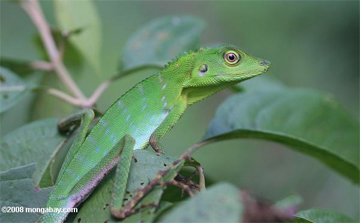Malaysia contains an amazing array of plants and animals, including this water monitor. Photo taken in Sabah by Rhett A. Butler
Malaysia ended 2010 with the confiscation of 4.3 metric tons of reptiles near the Thai border on December 20th, reports the Wildlife Trade Monitoring Network, TRAFFIC. The confiscation was the largest of the year and consisted of over 1,800 monitor lizards, snakes, freshwater turtles, and tortoises.
All of the species seized are protected under CITES (the Convention on International Trade in Endangered Species of Wild Fauna and Flora), which allows international trade of certain species strictly by permit. Included in the confiscation were 18 brown tortoises Manouria emys and 10 yellow-headed temple turtles Hieremys annandalii, both of which are listed as Endangered on the IUCN Red List, as well as over 400 giant Asian pond turtles Heosemys grandis, which are listed as Vulnerable.
Malaysia is a major trafficking hub, from where many rare and threatened species are exported abroad for the pet trade, and for use as food and traditional Chinese medicine. While certain measures have been taken, illegal trade in animals remains high.
“TRAFFIC highly commends the Customs officers responsible for this seizure. However, the scale of this haul underlines the fact that the illegal trade of protected wildlife in Malaysia remains a serious problem”, said Chris R. Shepherd, Deputy Director of TRAFFIC Southeast Asia.
 Green Crested Lizard. Photo taken in Sabah by Rhett A. Butler |
In August of this year, the Malaysian government passed the Wildlife Conservation Bill 2010 which will improve upon the 38-year-old Protection of Wildlife Act by raising existing fines, implementing new penalties, and closing loopholes. Under the new bill, the poaching of a clouded leopard, Sumatran rhino, or tiger will incur a fine of 100,000 Malaysian ringgit ($31,600) and a mandatory sentence of up to five years in prison. The legislation also sets minimums for fines, makes it illegal to use snares, and penalizes zoos which do not have the appropriate operating permits.
However, the Wildlife Conservation Bill which was supposed to take effect before the end of the year still has yet to be implemented.
2010 is also marked by the arrest of one of Malaysia’s most notorious traffickers. Anson Wong, also known as the “Lizard King”, was sentenced in September by a Malaysian court to five years in prison for attempting to smuggle 95 boa constrictors to Jakarta aboard a passenger plane. Authorities, alerted by a luggage malfunction, found the snakes along with two rhinoceros vipers and one matamata turtle. Wong, 52, was also initially fined RM190,000 ($61,000), but it was later returned to him after an appeal by his lawyer. In 2001 Wong was sentenced by US courts to 71 months in prison and fined $60,000 for animal trafficking.
The majority of the animals seized by Malaysian officials in December were auctioned off to wildlife dealers, while those that are protected in Malaysia were given to the Wildlife and National Parks Department.
Related articles